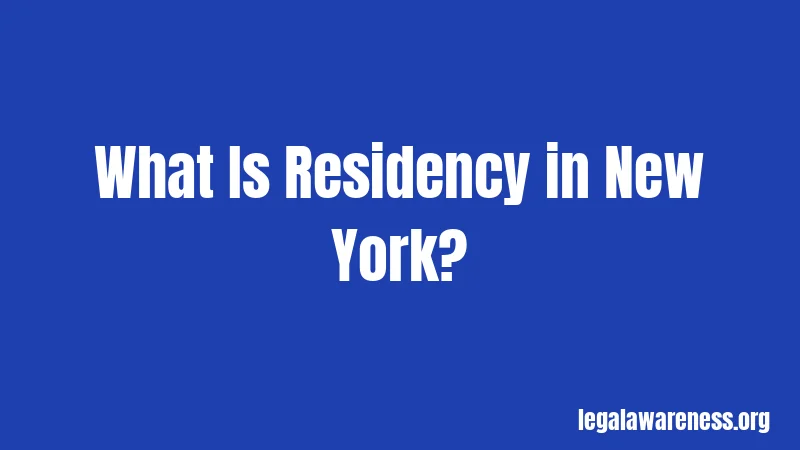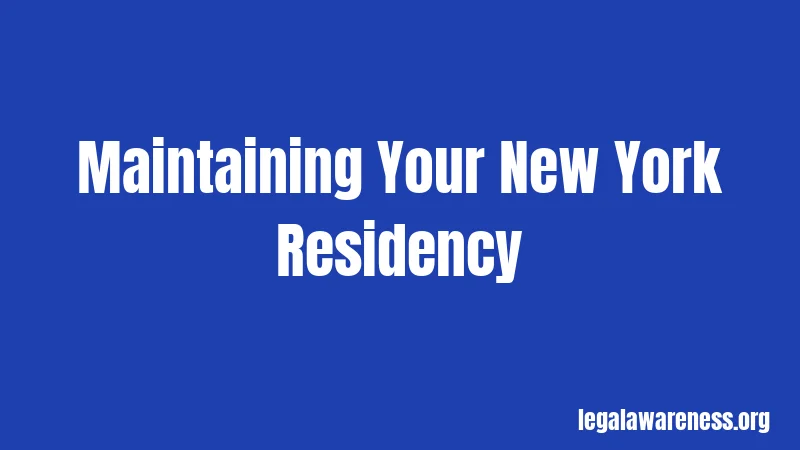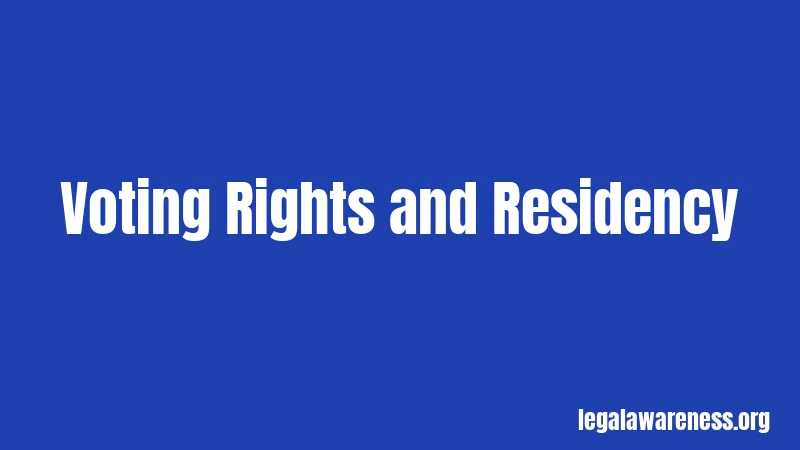New York Residency Laws in 2026: Your Complete Guide to Living and Establishing Domicile
Most people have no idea how important residency laws actually are. Seriously. But in New York, where you legally live matters way more than you might think. It affects taxes, voting, school enrollment, and even insurance rates. Let’s break down exactly what you need to know about establishing and maintaining residency in New York.
Why should you care about this? Because getting residency wrong can cost you money and create legal headaches. Whether you’re moving to New York, leaving the state, or just want to understand where you officially live, this guide will walk you through it.
What Is Residency in New York?

Think of residency as your official home base for legal purposes. It’s where the government says you live. This matters because it determines which state taxes you pay. It also affects which courts have power over you. And it impacts voting rights and student financial aid eligibility.
Here’s the thing: residency is different from just living somewhere. You can sleep in a place every night. But residency is the legal status that matters. New York takes this distinction seriously. Basically, residency is about where you intend to stay and where your home base truly is.
Establishing Residency in New York
Okay, let’s get into the actual rules. Establishing New York residency isn’t as simple as signing a lease. The state looks at several factors together. No single thing makes you a resident. Instead, officials consider the whole picture of your situation.
Intent and Physical Presence
First, you need to show intent to live in New York. This means more than just being here temporarily. You have to show you plan to stay and make it your home. How do they know? They look at your actions and decisions.
Living in New York for at least 183 days in a calendar year is huge. That’s basically half the year. If you’re in the state for that long, you’re establishing residency. But it’s not just about the calendar. Where you spend your time matters too.
Documentation That Proves Residency
You’re probably wondering what paperwork actually proves residency. It’s more varied than most people think. Here’s what counts.
A driver’s license or non-driver identification card with a New York address is strong evidence. So is a lease agreement or deed showing you live here. Voter registration in New York also demonstrates intent. Bank statements, utility bills, and insurance documents help too.
The more documents you have, the stronger your claim. Think of it like building a case. One piece of paper might not be enough. But several different types of documents together tell a clear story. That’s what officials look for.
Establishing Residency When You Move
When you actually move to New York, timing matters. You don’t become a resident on your first day. The state generally needs to see that you’ve settled here. This usually takes about 30 to 45 days of establishing ties. But honestly, it depends on the situation.
Start collecting evidence immediately. Get your driver’s license changed. Register to vote. Update your address with the Post Office. Change your bank and insurance addresses. Each step strengthens your residency claim.
Maintaining Your New York Residency

Okay, this is important: you can lose residency if you’re not careful. Just establishing it isn’t enough. You have to maintain it too. This happens when you move away and establish residency elsewhere.
If you move out of New York and spend more time in another state, you might lose your residency status. The state watches for signs that you’ve abandoned New York as your primary home. Not paying taxes in New York is a red flag. So is registering your car somewhere else or changing your voter registration.
Stay with me here, because this next part surprises a lot of people. You can actually keep New York residency even if you’re away for extended periods. The key is showing that you intend to return. Keep your apartment or home. Keep your New York license and registration. Keep voting in New York. These actions show you haven’t abandoned the state.
Tax Implications of New York Residency
Here’s where things get serious. Your residency status directly affects how much state tax you owe. If you’re a New York resident, you pay taxes on all your income. Yes, even income earned outside the state. This applies whether you work in another state or are self-employed internationally.
Non-residents only pay New York taxes on income earned in New York. So if you’re technically still an Arizona resident but work in New York, you pay taxes on that New York income. But you don’t pay on other earnings. Makes sense, right?
New York has one of the highest tax rates in the country. So tax residency isn’t just paperwork. It’s about real money. People actually try to change their residency status to reduce tax bills. The state watches for this closely. If you claim to be a non-resident but act like a resident, the Department of Revenue will catch that. And they’ll make you pay back taxes plus penalties.
Recent Changes (2024-2025): New York has been aggressive about auditing residency claims. The state now matches driver’s license data with tax returns. They’re cracking down on people who maintain multiple homes but claim to be non-residents. If you’re in this situation, get professional help from a tax advisor now.
Voting Rights and Residency

Here’s where it connects to your civic participation. You can only vote in New York if you’re a resident. Simply being in the state doesn’t make you a voter. You have to register, and registration requires residency. You have to be a New York resident for at least 30 days before an election to vote in that election.
Not sure what counts as residency for voting? It’s essentially where you’ve established your home with intent to stay. Your registered address should be where you actually live. Voting at an address where you don’t sleep most nights is election fraud. That’s a serious crime. So don’t do it, obviously.
You can keep your voter registration even during short absences. A business trip or vacation doesn’t change your voting status. But moving to another state and living there? That means you should update your registration. It’s the right thing to do legally and ethically.
Residency Requirements for Schools and Benefits
Wondering how this affects your kids’ education? School enrollment also requires residency proof. Public schools are funded by your local taxes. So they only enroll residents. Attending a school outside your residency area is possible, but it gets complicated. Some families use relatives’ addresses as their official residence. But falsifying residency information for school is fraud.
In-state tuition at State University of New York (SUNY) schools requires residency. Out-of-state tuition is significantly more expensive. So where you establish residency really matters for college costs. You need to be a New York resident for one full year before enrolling to get in-state rates. This is why some students plan their residency carefully.
Financial aid eligibility depends on residency too. The FAFSA uses your state of residency to determine aid amounts. Different states offer different grants and scholarships. Getting this right can impact your college affordability. If you’re planning to attend SUNY schools, think about residency status early.
Dual Residency and Multiple Homes
Okay, here’s where it gets tricky. Can you legally be a resident of two states? Generally, no. You’re supposed to have one primary residence. One domicile. One state where you truly intend to make your home.
But what if you own homes in two states? This happens a lot with wealthy people or retirees. Owning property doesn’t automatically make you a resident. You have to actually live there and intend to stay. You can own a vacation home somewhere without being a resident there.
The state looks at where you spend most of your time. Where your family lives. Where your car is registered. Where your job is. Where your kids go to school. All these factors together determine your true residency. If you’re splitting time equally between two homes, New York might challenge your residency claim. This is where professional advice gets really valuable.
Military Members and Residency
Military families have special rules. If you’re stationed in New York but you’re from another state, you maintain your home state residency. The law recognizes that military assignments are temporary. You don’t automatically become a New York resident just because you’re stationed here.
This matters for taxes and voting. Military members can vote in their home state even while stationed elsewhere. They can claim home state residency for tax purposes. But if you choose to establish New York residency, you can. The choice is yours.
When you leave military service, you keep whatever residency you established. So if you served in New York for 10 years and established residency, you’re still a New York resident unless you change it. Choose your status carefully because it has lasting effects.
What Happens If You Lie About Residency
Hold on, this part is important. Falsifying residency can be prosecuted as fraud. We’re not just talking about tax penalties. We’re talking about criminal charges. People have gone to prison for residency fraud.
If you claim to be a non-resident to avoid taxes but you actually live in New York, that’s tax evasion. The state can charge you with a misdemeanor or felony depending on the amount owed. Fines can reach tens of thousands of dollars. Plus you owe back taxes with interest. Plus penalties. It adds up fast.
The penalties extend beyond just money too. A residency fraud conviction affects employment, especially government jobs. It damages your reputation. And ironically, it often costs more to fight it than to just pay taxes honestly. Personally, I think this is the part most people underestimate.
Voting fraud based on false residency is also serious. You could face criminal charges, fines, and jail time. Election integrity is something states take very seriously.
How to Change Your Residency Status
Maybe you’re moving out of New York. Or maybe you established residency here and now want to move away. How do you officially change your status?
First, you need to establish residency in the new location. Get a driver’s license or ID there. Register your vehicle. Open a bank account with your new address. Register to vote. All these things show you’ve made a commitment to the new place.
Update the IRS about your address change. This is crucial for taxes. File your taxes with your new state of residency. Even if you think you’re not a resident, update your records. Better to be clear than to have the state come after you later.
Don’t keep your New York residency status while claiming to live elsewhere. That looks like you’re trying to game the system. And New York’s Department of Revenue will notice. Clean breaks are better than messy situations.
Give yourself a solid transition period. Try to avoid making major changes mid-year if possible. Establish your new residency for at least 183 days in the calendar year. Then, on January 1st of the next year, you can clearly be a resident of your new location. The math is clearer that way.
Special Circumstances and Exceptions
Some situations complicate residency rules. Students who attend college in New York but plan to leave after graduation usually don’t establish residency. They maintain their parents’ home state residency. Living in a college dorm or renting an apartment near campus doesn’t automatically make you a New York resident.
People in nursing homes or assisted living facilities sometimes deal with residency questions. The general rule: you keep the residency status you had before entering the facility. Simply living somewhere doesn’t change it.
Homeless individuals can still maintain residency claims. Sleeping in a shelter or living in a car doesn’t erase residency. If you establish ties before losing stable housing, you can maintain residency status. This matters for voting rights and service eligibility.
Undocumented immigrants have a unique situation. They can’t get driver’s licenses in New York (though new rules are being discussed). But they can still establish residency for certain purposes. This affects school enrollment and some benefits. Immigration status and residency status are separate legal questions.
Resources and Where to Get Help
Not sure about your specific situation? Professional help is worth the investment. A tax professional or attorney can review your circumstances. They’ll tell you whether your current residency status is defensible. And they’ll help you change it legally if needed.
The New York Department of State website has official information. You can find residency requirements for voting and licensing there. The Department of Revenue handles tax residency questions. The Board of Elections answers voting-specific questions.
If you’re changing residency for college, contact the college’s financial aid office. They understand residency rules for education. They can guide you through the process. Don’t just guess and hope for the best.
Frequently Asked Questions
How long do I have to live in New York to become a resident? Generally, 183 days in a calendar year plus intent to make it your home. But intent is as important as time. You could live here 200 days and still not be a resident if you clearly don’t plan to stay. Conversely, you could establish residency faster if you show clear commitment.
Can I be a resident of two states at once? Legally, no. You’re supposed to have one domicile where you intend your principal home to be. You can own property in multiple states without being a resident. But you can’t claim residency in two places simultaneously for taxes or voting.
If I own a home in New York, am I automatically a resident? No. Owning property doesn’t equal residency. You become a resident when you live there with intent to stay. You could own a vacation home and still be a resident of another state where your family actually lives.
What happens if I try to claim non-resident status but the state says I’m a resident? The Department of Revenue can audit you and demand back taxes plus penalties and interest. If the difference is large, criminal prosecution is possible. Professional tax advice before making the claim can help you avoid this situation.
How do I establish residency when I first move to New York? Get a New York driver’s license, register your vehicle, open a bank account with a New York address, register to vote, and update important documents. The more pieces of evidence you create, the stronger your residency claim becomes.
Final Thoughts
New York residency might seem like just administrative stuff. But it has real consequences for taxes, voting, school access, and financial aid. Getting it right saves money and prevents legal problems. Getting it wrong can cost you significantly.
Now you know the basics. The key is being honest about where you actually live. Establish residency with clear intent. Maintain it with your actions and documents. And if you’re changing residency status, do it properly and completely.
When in doubt, talk to a tax professional or attorney. The cost of getting advice is way less than the cost of fixing residency fraud later. Stay informed, keep your records updated, and you’ll be fine.
References
- New York Department of State: Voter Registration and Residency
- New York Department of Taxation and Finance: Resident vs. Non-Resident
- New York State Legislature: Vehicle and Traffic Law
- SUNY: Residency Requirements for In-State Tuition
- IRS: Establishing Residency and State Tax Obligations
- New York Courts: Residency and Jurisdiction
